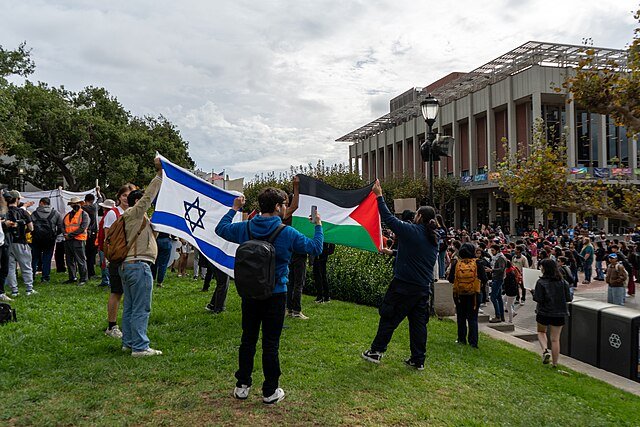Governments around the world respond to pro-Israel and pro-Palestinian demonstrations
Photo Courtesy: Wikimedia Commons
Following the 7th October attack by Hamas on Israel and the ensuing war that has killed an estimated 11,240 Palestinians (as of Monday 13th November), numerous protests have taken place around the world. In London, thousands of pro-Palestinian protestors gathered on October 14th near Oxford Circus to call for an end to Israeli airstrikes and the blockade in the Gaza Strip.
Global government responses to these protests have varied greatly. Buildings and monuments around the world were lit up in white and blue as a show of solidarity with Israel on 9th October in the immediate wake of the attack. In the UK and the US respectively, leaders Rishi Sunak and Joe Biden have both supported Israel’s right to defend itself. Recently sacked Home Secretary Suella Braverman had stark comments to make about protestors on X (previously known as Twitter), describing planned protests as a “hate march” and saying that there was “an obvious risk of serious public disorder, violence and damage”. Sunak stated that marches that took place on the 11th November would be “provocative and disrespectful”.
Biden, in the immediate aftermath of the attack, told Israeli Prime Minister Benjamin Netanyahu that the US “[stands] ready to offer all appropriate means of support to the government and people of Israel”. Growing disillusionment with Biden’s support of Israel has been evident in protests in the US, with signs saying “Biden betrays us” and “In November we remember” that allude to his precarious political position in the upcoming 2024 elections.
On the 16th November in Los Angeles, more than 1,000 protestors shut down a stretch of Hollywood Boulevard and demanded Joe Biden and US lawmakers call for an immediate suspension of hostilities. Elsewhere, European Union leaders have advocated for humanitarian “pauses” in place of an outright ceasefire.
In Berlin, which has one of the largest diaspora communities outside of the Middle East that includes an estimated 30,000 Palestinians, police have only approved two requests for pro-Palestine protests, both of which were proposed as silent vigils. At least seven protests were denied permission, including two titled “Jewish Berliners Against Middle Eastern Violence” and “Youth Against Racism”. Berlin’s education authorities have also considered banning students from wearing the Palestinian Keffiyeh scarf and “free Palestine” stickers.
Even before the Hamas attack, the German government has been restricting pro-Palestinian demonstrations. Amnesty International condemned this in September, saying that the German police’s justifications for bans on pro-Palestinian groups were based on “stigmatizing and discriminatory stereotypes” on people “from the Arab diaspora, in particular with Palestinian background”.
French Interior Minister Gerald Darmanin stated that “pro-Palestinian demonstrations must be prohibited because they are likely to generate disturbances to the public order”, while a protest on the 12th November in Paris saw more than 100,000 people marching against antisemitism. Since October 7th, France has banned nine protests, with 752 fines and 43 arrests. French authorities have registered more than 1,000 acts of discrimination against Jews in France since the start of the conflict, which is nearly three times more than in the whole of 2022. In a letter published in Le Parisien newspaper, President Emmanuel Macron wrote: “A France where our Jewish fellow citizens are afraid is not France.”
Germany and France have alluded to their sensitive past regarding anti-semitism when justifying these blanket bans on pro-Palestinian protests. German Chancellor Olaf Scholz explained: “Our history, our responsibility for the Holocaust makes it our duty in every moment to stand for the existence and security of Israel.” However, this has also led human rights groups to express concern over pre-emptive bans on free speech becoming the norm – as signatories of the European Convention of Human Rights, France and Germany are bound by law to protect free speech and the right to protest. Some supporters of Palestine will be risking arrest, their jobs, or their immigration status by protesting.
In Australia, pro-Palestinian protests are increasing in number while parliament sits.
How global authorities choose to act in the future will no doubt influence the demands of protestors, but what remains clear is that calls for a ceasefire will not be stopping, as people continue to protest against the loss of human lives due to this conflict.

